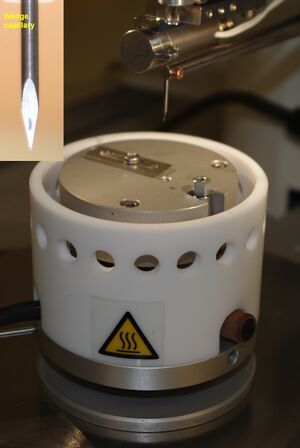Specific Process Knowledge/Back-end processing/Wire Bonder
Feedback to this page: click here
TPT Wire Bonder

Bond head with insert showing wedge capillary
 Will be temporary taken out of service during the PolyFabLab construction.
Will be temporary taken out of service during the PolyFabLab construction.
The TPT Wire Bonder is bought i 2007. Wire bonding is a method of making interconnections between a microchip and other electronics as part of semiconductor device fabrication. The TPT-H05 is a manuel wire bonder. It is possible to do wedge bonding with either aluminum wires or gold wires as well as gold ball bonding.
The user manual(s), user APV(s), technical information and contact information can be found in LabManager (requires login):
Ball Wire Bonder K&S 4524
 Will be moved to building 451 during the PolyFabLab construction.
Will be moved to building 451 during the PolyFabLab construction.
The Ball Wire Bonder K&S 4524 is for high precision ball bonding. It is a semi-automatic wire bonder with good control of bond placement and bonding parameters.
The user manual(s), user APV(s), technical information and contact information can be found in LabManager (requires login):

| Equipment | TPT Wire Bonder | Ball Wire Bonder | |
|---|---|---|---|
| Purpose |
|
| |
| Performance |
|
| |
| Substrates | Allowed materials |
| |
